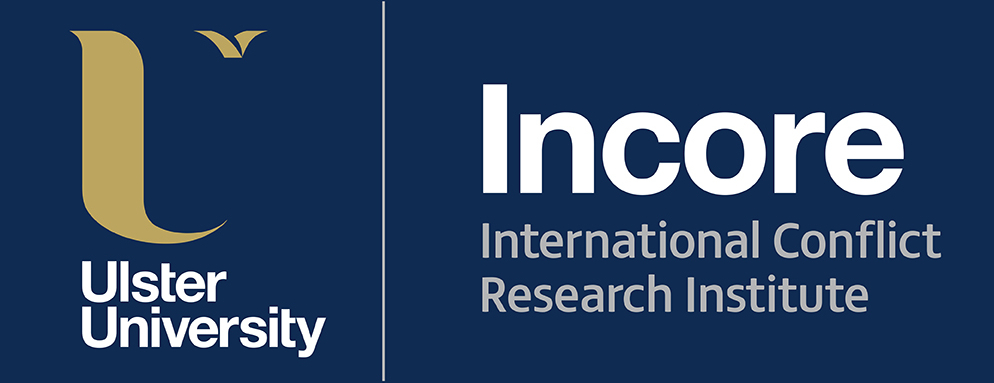The Accounts of the Conflict International Conference is now only days away. “Digitally Archiving Stories for Peacebuilding” takes place at the Holiday Inn, Ormeau Avenue, Belfast on 17-18 November. Interest in the conference has been very encouraging and we are looking forward to meeting all those who have registered to date. Some last minute spaces may still be available. To inquire about the possibility of late registration, please email Shonagh Higgenbotham s.higgenbotham@ulster.ac.uk.
The Accounts of the Conflict project team are busy working on the finer details of conference planning this week. The programme has been updated to include details of the parallel sessions, which will explore some of the themes identified in the plenary lectures over the two days of the conference. You can find more information about these sessions, and the programme generally here https://accounts.ulster.ac.uk/accounts/conference/programme/
The Accounts of the Conflict Archive will be launched at 4.45pm on Day One of the conference. Following the launch, the archive will also become publicly available on the Internet for the first time. We are very glad to have the Chancellor of Ulster University, Dr James Nesbitt, launch the Archive along with the Vice-Chancellor, Professor Richard Barnett and Chief Executive of the Special EU Programmes Body, Pat Colgan.
The conference will be a great opportunity to discuss the variety of issues that arise from storytelling, oral history practice, and digitally archiving stories. The issues to be discussed in the parallel sessions include the legal and ethical sides of collecting stories and placing them online. This is an area that is in its infancy and there are a variety of challenges and opportunities in disseminating stories on the Internet. We will also discuss how political and social context can affect what is contained in oral history collections, and how archivists face challenges in placing conflicting stories together on websites and in digital archives.
The more technical elements of archive construction will be explored in some of the parallel sessions. One of these sessions will see members of the Accounts of the Conflict team relating their experiences of working on the project from its inception to its public launch. In other sessions, participants will discuss the practicalities of building a digital archive and overcoming some common hurdles like ensuring effective search capability, access and representation. How, for instance, can we ensure that ‘forgotten voices’ are heard?
Finally, the sessions will turn to the topic of utilising the stories in digital archives for a range of purposes. The process of telling one’s story can offer therapeutic benefits to the storyteller. Archiving and making these stories available to all is important too, and can contribute to peacebuilding by allowing anyone with an Internet connection to listen to a wide variety of personal experiences of conflict. Digital archives also have the potential to ensure that these diverse stories are disseminated as widely and effectively as possible. Participants in these sessions will explore how, for instance, young people can be engaged, and how we can be creative in our approach to dissemination through exhibitions, dramatic productions and multi-media publications. Ultimately, we want to explore how the personal narratives available in digital archives can be used in efforts to build peace and promote social change.
The conference programme includes an opportunity to see how some of the story-collecting projects in Northern Ireland and Border Region have been disseminating their collections through the medium of film. In this post-dinner session on Day One, we will screen short extracts of documentary style films that have personal narrative at their core. This will be followed by a brief discussion between those who were centrally involved in the production of the films and the attendees at the session. Extracts from the Prisons Memory Archive, Glortha Aduaidh / Northern Voices, and Out of Adversity (Peace Process: Layers of Meaning), will be shown.
The conference structure has been developed in a conscious attempt to include the attendees in discussions as much as possible. There will be time for some questions and answers in the plenary sessions, but the parallel sessions have been designed to be as informal and interactive as possible. The speakers in each of these sessions will speak briefly about their work or the ideas they wish to discuss. The sessions will then be opened up to discussion with a facilitator who will ensure, as far as possible, that everyone who wishes to contribute will be able to do so.
The speakers in the parallel sessions are leading international experts, local practitioners and researchers. Our plenary speakers will take part in sessions relevant to their fields of interests and they will be joined members of staff from INCORE, Ulster University, the Public Record Office of Northern Ireland, the National Archives of Ireland, RTE Archives, the Ulster Museum, the UK Data Archive and many more. Those due to take part in the sessions include:
- Aileen O’Carroll – Digital Repository of Ireland
- Alan McCully – Ulster University
- Anna Bryson – Queen’s University, Belfast
- Boro Kitanoski – Peace Action, Macedonia
- Cahal McLaughlin – Queen’s University Belfast
- Catriona Crowe – National Archives of Ireland
- Claire Hackett – Duchas Project
- Clifford Harkness – National Museums Northern Ireland
- Darren Scott – St Dominic’s Grammar School, Belfast
- David Huddlestone – PRONI
- Donal O’Hagan – Nendrum College
- Elisabeth Baumgartner – swisspeace
- Faiha Abdul Al Hadi – Independent Consultant, Palestine
- Graham Jackson – PRONI
- Grainne Loughran – PRONI
- Iratxe Momoitio – Gernika Peace Museum
- John Peto – Nerve Centre
- Johnston Price – Forthspring Intercommunity Group
- Joy Carey – PRONI
- Kate Turner – Healing Through Remembering
- Lesley Emerson – Queen’s University, Belfast
- Liam Wylie – RTE Archives
- Libby Bishop – UK Data Archive
- Louise Corti – UK Data Archive
- Magdalena Weiglhofer – Ulster University
- Mhairi Sutherland – Crows on the Wire
- Michelle Moloney – Independent Consultant
- Patricia Lundy – Ulster University
- Peter Heathwood – Victims and Survivors Forum
- Proscovia Svard – Sodertorn University, Sweden
- Ramsay Liem – Boston College
- Sara Duddy – Pat Finucane Centre
- Seamus Farrell – Towards Understanding & Healing
- Sumona Das Gupta – Chair of the INCORE International Advisory Group
- Triona White Hamilton – Curator of Ordinary Objects, Extraordinary Times Exhibition
- William Blair – Ulster Museum
We are looking forward to welcoming all of our attendees and to spending two days listening to, and discussing, what is sure to be an interesting cross section of ideas from archivists, community workers, film makers, academics, educationalists, curators and many more. See you on the 17th.
DOWNLOAD THE CONFERENCE PROGRAMME HERE
- Closing Remarks - 3rd December 2014
- Conference: 17-18 November 2014 - 14th November 2014
- Conference: Less Than a Week to Go - 13th November 2014






